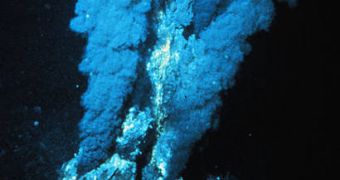Sediments that researchers found underneath the Pacific Ocean proved to be more than just mud. Inside it, experts found a new type of bacteria that is apparently able to tie down heavy metals, and thus may hold the key to creating more effective water cleaning agents. If the studies are successful, then it could be applied in a large number of mining lakes and creeks around the world, where pollution with heavy metals and with arsenic or cyanide is at critical levels. The strain that was identified can isolate manganese from mixtures, and bind it into manganese oxides, which are insoluble.
The Chinese research team was conducted by expert Gejiao Wang, a professor at the Huazhong Agricultural University in Wuhan. Results of their finds are published in the latest issue of the scientific journal Microbiology. The strain that proved to have the amazing properties belongs to the Brachybacterium genera, and has been called Mn32. It has a high effectiveness level against the heavy metal, despite the fact that it was found in such a reclusive and harsh environment.
In addition to binding with the manganese, the bacteria also caused the ensuing oxides to do the same thing, and thus had a double-action on the pollutant. Through more research, the experts hope to find a way of turning the microorganism into a solid base for the next generations of pollutant-cleaning material. Chemical substances, in use today, are beginning to show their limits, and, even though they help, they too pollute to some extent. On the other hand, the bacteria are completely environmentally-friendly.
“The next stage of our research is to immobilize this bacterial strain into a bioreactor to test its ability to remove manganese and other heavy metals in such a system. If successful it could provide a more efficient way to clean up heavy metal pollutants,” Wang said of the find, PhysOrg reports. Manganese oxides are already known to absorb nickel and zinc, but it has been recently proven that the oxides created from the bacterial action process actually store two to three times the quantity they would otherwise do.

 14 DAY TRIAL //
14 DAY TRIAL //